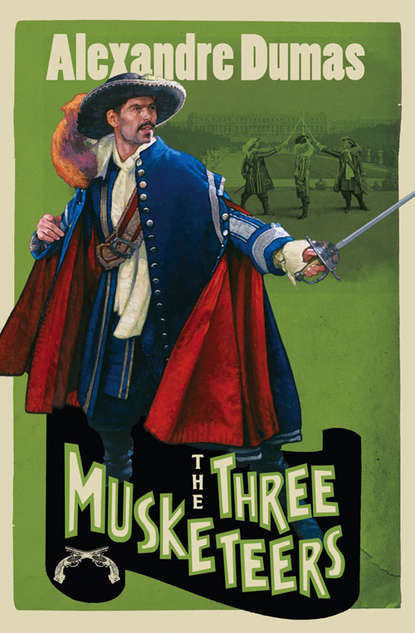По всем вопросам обращайтесь на: info@litportal.ru
(©) 2003-2024.
✖
The Three Musketeers
Автор
Год написания книги
2018
Настройки чтения
Размер шрифта
Высота строк
Поля
“And it is because I confide in that justice, sire, that I shall calmly and patiently await your majesty’s good pleasure.”
“Wait then, sir, wait then,” said the king, “and it will not be long.”
In fact, at that moment the chances of the game turned against the king, who began to lose what he had before gained. Therefore he was not sorry to find an excuse (to use an expression of the gaming table, of which we confess we know not the origin) for making Charlemagne. The king therefore rose, and putting into his pocket the money which was before him, and most of which he had won—
“La Vieuville,” said he, “take my place. I must talk with M. de Treville on an affair of importance. Ah! I had eighty louis before me: lay down the same sum, that those who have lost may not want their revenge. Justice above all things!”
Then turning towards M. de Treville, and walking with him towards a recess in one of the windows—
“Well, sir,” continued he, “you affirm that it is the guards of his eminence who seek quarrels with your musketeers?”
“Yes, sire; invariably.”
“Well, and how did this affair happen? Relate the facts; for you know, my dear captain, a judge must hear both parties.”
“Oh! by my faith, in the most simple and natural manner: three of my best soldiers, whom your majesty knows by name, and whose services you have often appreciated, and who, I can assure your majesty, are wholly devoted to your service—three of my best soldiers, Athos, Porthos, and Aramis, had made a party of pleasure with a young Gascon, a volunteer, whom I had introduced to them the same morning. The party was to be held at St. Germain’s, I believe; and the rendezvous was fixed at Carmes-Deschaux, when it was interrupted by de Jussac, Cahusac, Biscarrat, and two other musketeers of the cardinal who doubtless did not assemble there in such force without some intention in opposition to the edicts.”
“Ah! you give me ground for a conjecture,” said the king; “doubtless they came there to have an affair of honour.”
“I do not accuse them, sire, but I leave your majesty to judge what five armed men could be doing in a spot so retired as is the neighbourhood of the convent.’
“Very true, Treville; yes, you are right.”
“But, when they saw my musketeers, they changed their intentions, and forgot their individual and personal hatred, to indulge their enmity towards our corps; for your majesty well knows that the musketeers, who are wholly for the king, and nothing but the king, are the natural enemies of the guards, who are for the cardinal alone.”
“Yes, Treville,” said the king sorrowfully; “and it is a sad thing, believe me, thus to see two parties in France—two royal heads, as it were, under one crown. But this must be brought to an end. You say, then, that the guards sought a difference with the musketeers?”
“I say it is probable that this was the case, but I do not swear to it, sire. Your majesty well knows how difficult it is to discover the truth, unless, indeed, one were gifted with that admirable penetration which has caused Louis XIII. to be named the Just.”
“There again you are right, Treville. But your musketeers were not alone; there was a boy with them.”
“Yes, sire, and a wounded man; so that three of the king’s musketeers, of whom one was wounded, and this boy, not only made head against five of the most formidable of the cardinal’s guards, but even bore four of them to the earth.”
“Why, it is a complete victory!” exclaimed the king, radiant with joy—“a most complete victory!”
“Yes, sire, as complete as that of the bridge of Cé.”
“Four men—of whom one was wounded, and another a boy—do you say?”
“A stripling; but who behaved so nobly on this occasion, that I shall take the liberty of recommending him to your majesty.”
“What is his name?”
“D’Artagnan, sire; he is the son of one of my oldest friends—the son of a man who was engaged in the Partizan war on the side of the king your father, of glorious memory.”
“And you say this youth acquitted himself bravely? Tell me all about it, Treville, for you know how I love to hear of war and combats.”
And the king placed himself in an attentive posture, at the same time twirling his moustache in a military manner.
“Sire,” replied M. de Treville, “as I have already told you, M. d’Artagnan is almost a child; and as he has not the honour of being a musketeer, he was in plain clothes. The cardinal’s guards, perceiving his youth and also that he was a civilian, invited him to retire before they commenced their assault.”
“Thus we may clearly perceive, Treville,” interrupted the king, “that it was the guards who began the attack.”
“Most assuredly, sire, there cannot be a doubt on the subject. They therefore warned him to retire; but he replied that as he was at heart a musketeer, and wholly devoted to his majesty, he should remain with the musketeers.”
“Brave youth!” murmured the king.
“And he did remain with them; and in him your majesty has the resolute and valiant champion who gave Jussac that terrific sword thrust which has so much enraged the cardinal.”
“He who wounded Jussac?” exclaimed the king. “He—a boy! Treville, it is impossible!”
“It is as I have the honour to inform your majesty.”
“Jussac! one of the best duellists in the realm!”
“Yes, sire; but he has now found his master.”
“Treville, I must see this young man,” said Louis; “I must see him; and if I can do anything———However, we will think about that.”
“When will your majesty condescend to receive him?”
“Tomorrow, at twelve, Treville.”
“Shall I bring him alone?”
“No, bring the other three. I wish to thank them all at the same time. Men so brave are rare, Treville, and such devotion ought to be rewarded.”
“At twelve, sire, we will be at the Louvre.”
“By the private staircase, Treville—by the private staircase; it is unnecessary to let the cardinal know it.”
“Yes, sire.”
“You understand, Treville; an edict is always an edict; at all events, fighting is forbidden by the law.”
“But this combat,” said Treville, “is altogether different from the common duels: it was a sudden brawl; and the proof of it is, that there were five of the cardinal’s guards against three of the musketeers and M. d’Artagnan.”
“It is quite true,” said the king; “yet, nevertheless, Treville, come by the private staircase.”
Treville smiled; but conceiving that he had already secured an important advantage, by thus inducing the pupil to rebel against his master, he respectfully saluted the king, and, with his permission, made his retiral.
The same evening the three musketeers were apprised of the honour intended for them. As they had long known the king, they were not much enchanted by the news; but d’Artagnan, with his Gascon imagination, saw in it his future fortunes, and passed the night amid golden dreams. By eight in the morning he was with Athos, whom he found dressed, and ready to go out.
As they were not to see the king until twelve o’clock, and Athos had engaged to meet Porthos and Aramis at a tennis-court, near the Luxembourg stables, to play a match of tennis, he invited d’Artagnan to join them. Although ignorant of the game, which he had never played, d’Artagnan accepted the invitation, not knowing how otherwise to dispose of his time in the interval. Porthos and Aramis were already there, knocking the balls about. Athos, who was very skilful in all athletic games, went to one side with d’Artagnan, and challenged them. But at the first movement which he made, although he played with his left hand, he found that his wound was too fresh to permit such an exertion. D’Artagnan, therefore, remained alone; and as he declared that he was too unskilful to play a regular game, they only sent the balls about, without counting the points. One of these balls, however, driven by the Herculean hand of Porthos, passed so near d’Artagnan as to satisfy him that, had it hit him full in the face, instead of going on one side, his royal audience would have been lost, as, in all probability, he would thereby have been rendered unfit to be presented to the king. Now, since, in his Gascon imagination, all his fortune depended upon this audience, he politely saluted Porthos and Aramis, declaring that he would not renew the game until he was up to their standard, and then took his station near the ropes and the gallery.
Unfortunately for d’Artagnan, amongst the spectators there was one of the cardinal’s guards, who was irritated by the previous night’s defeat of his companions, and had resolved to take the first opportunity of avenging it. He now believed that this opportunity had arrived, and addressing a bystander—
“It is no wonder,” said he, “that this young man is afraid of the ball; he is, doubtless, a musketeer recruit.”

















